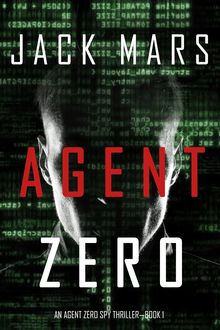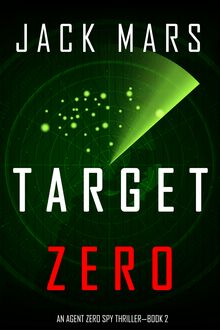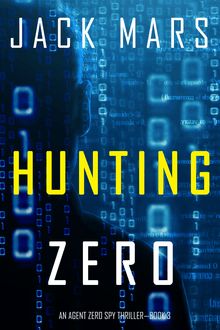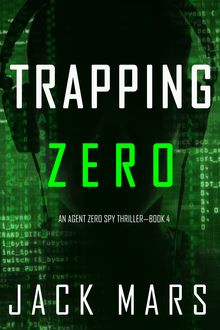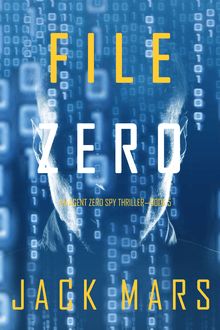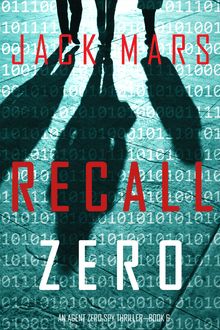Agent Zero (An Agent Zero Spy Thriller—Book #1) , livre ebook
221
pages
English
Ebooks
2019
Vous pourrez modifier la taille du texte de cet ouvrage
Obtenez un accès à la bibliothèque pour le consulter en ligne En savoir plus
Découvre YouScribe en t'inscrivant gratuitement
Découvre YouScribe en t'inscrivant gratuitement
221
pages
English
Ebooks
2019
Vous pourrez modifier la taille du texte de cet ouvrage
Obtenez un accès à la bibliothèque pour le consulter en ligne En savoir plus
Publié par
Date de parution
28 juin 2019
Nombre de lectures
203
EAN13
9781640297999
Langue
English
Publié par
Date de parution
28 juin 2019
Nombre de lectures
203
EAN13
9781640297999
Langue
English
A G E N T Z E R O
(AN AGENT ZERO SPY THRILLER BOOK 1)
J A C K M A R S
Jack Mars
Jack Mars is the USA Today bestselling author of the LUKE STONE thriller series, which includes seven books. He is also the author of the new FORGING OF LUKE STONE prequel series, comprising three books (and counting); and of the AGENT ZERO spy thriller series, comprising six books (and counting).
Jack loves to hear from you, so please feel free to visit www.Jackmarsauthor.com to join the email list, receive a free book, receive free giveaways, connect on Facebook and Twitter, and stay in touch!
Copyright © 2019 by Jack Mars. All rights reserved. Except as permitted under the U.S. Copyright Act of 1976, no part of this publication may be reproduced, distributed or transmitted in any form or by any means, or stored in a database or retrieval system, without the prior permission of the author. This ebook is licensed for your personal enjoyment only. This ebook may not be re-sold or given away to other people. If you would like to share this book with another person, please purchase an additional copy for each recipient. If you’re reading this book and did not purchase it, or it was not purchased for your use only, then please return it and purchase your own copy. Thank you for respecting the hard work of this author. This is a work of fiction. Names, characters, businesses, organizations, places, events, and incidents either are the product of the author’s imagination or are used fictionally. Any resemblance to actual persons, living or dead, is entirely coincidental.
Jacket image Copyright GlebSStock, used under license from Shutterstock.com.
BOOKS BY JACK MARS
LUKE STONE THRILLER SERIES
ANY MEANS NECESSARY (Book #1)
OATH OF OFFICE (Book #2)
SITUATION ROOM (Book #3)
OPPOSE ANY FOE (Book #4)
PRESIDENT ELECT (Book #5)
OUR SACRED HONOR (Book #6)
HOUSE DIVIDED (Book #7)
FORGING OF LUKE STONE PREQUEL SERIES
PRIMARY TARGET (Book #1)
PRIMARY COMMAND (Book #2)
PRIMARY THREAT (Book #3)
AN AGENT ZERO SPY THRILLER SERIES
AGENT ZERO (Book #1)
TARGET ZERO (Book #2)
HUNTING ZERO (Book #3)
TRAPPING ZERO (Book #4)
FILE ZERO (Book #5)
RECALL ZERO (Book #6)
CONTENTS
CHAPTER ONE
CHAPTER TWO
CHAPTER THREE
CHAPTER FOUR
CHAPTER FIVE
CHAPTER SIX
CHAPTER SEVEN
CHAPTER EIGHT
CHAPTER NINE
CHAPTER TEN
CHAPTER ELEVEN
CHAPTER TWELVE
CHAPTER THIRTEEN
CHAPTER FOURTEEN
CHAPTER FIFTEEN
CHAPTER SIXTEEN
CHAPTER SEVENTEEN
CHAPTER EIGHTEEN
CHAPTER NINETEEN
CHAPTER TWENTY
CHAPTER TWENTY ONE
CHAPTER TWENTY TWO
CHAPTER TWENTY THREE
CHAPTER TWENTY FOUR
CHAPTER TWENTY FIVE
CHAPTER TWENTY SIX
CHAPTER TWENTY SEVEN
CHAPTER TWENTY EIGHT
CHAPTER TWENTY NINE
CHAPTER THIRTY
CHAPTER THIRTY ONE
CHAPTER THIRTY TWO
CHAPTER THIRTY THREE
CHAPTER THIRTY FOUR
CHAPTER THIRTY FIVE
CHAPTER THIRTY SIX
CHAPTER THIRTY SEVEN
CHAPTER THIRTY EIGHT
EPILOGUE
"The life of the dead is placed in the memory of the living."
Marcus Tullius Cicero
CHAPTER ONE
The first class of the day was always the toughest. Students shuffled into the lecture hall at Columbia University like shiftless, dead-eyed zombies, their senses dulled by all-night study sessions or hangovers or some combination thereof. They wore sweatpants and yesterday’s T-shirts and clutched Styrofoam cups of soy mocha lattes or artisanal blonde roasts or whatever it was the kids were drinking these days.
Professor Reid Lawson’s job was to teach, but he also recognized the need for a morning boost a mental stimulant to supplement the caffeine. Lawson gave them a moment to find their seats and get comfortable while he took off his tweed sport coat and draped it over his chair.
"Good morning," he said loudly. The announcement jarred several students, who looked up suddenly as if they hadn’t realized they’d wandered into a classroom. "Today, we’re going to talk about pirates."
That got some attention. Eyes looked forward, blinking through the slush of sleep deprivation and trying to determine if he had really said "pirates" or not.
"Of the Caribbean?" joked a sophomore in the front row.
"Of the Mediterranean, actually," Lawson corrected. He paced slowly with his hands clasped behind his back. "How many of you have taken Professor Truitt’s class on ancient empires?" About a third of the class raised their hands. "Good. Then you know that the Ottoman Empire was a major world power for, oh, almost six hundred years. What you may not know is that the Ottoman corsairs, or more colloquially, the Barbary pirates, stalked the seas for much of that time, from the coast of Portugal, through the Strait of Gibraltar, and much of the Mediterranean. What do you think they were after? Anyone? I know you’re alive out there."
"Money?" asked a girl in the third row.
"Treasure," said the sophomore from the front.
"Rum!" came a shout from a male student in the back of the room, eliciting a chuckle from the class. Reid grinned too. There was some life in this crowd after all.
"All good guesses," he said. "But the answer is ‘all of the above.’ See, the Barbary pirates mostly targeted European merchant vessels, and they would take everything and I mean everything . Shoes, belts, money, hats, goods, the ship itself… and its crew. It’s believed that in the two-century span from 1580 to 1780, the Barbary pirates captured and enslaved more than two million people. They would take it all back to their North African kingdom. This went on for centuries. And what do you think the European nations did in return?"
"Declared war!" shouted the student in the back.
A mousy girl in horn-rimmed glasses raised her hand slightly and asked, "Did they broker a treaty?"
"In a way," Lawson replied. "The powers of Europe agreed to pay tribute to the Barbary nations, in the form of huge sums of money and goods. I’m talking Portugal, Spain, France, Germany, England, Sweden, the Netherlands… they were all paying the pirates to keep away from their boats. The rich got richer, and the pirates backed off mostly. But then, between the late eighteenth and early nineteenth century, something happened. An event occurred that would be a catalyst to the end of the Barbary pirates. Anyone want to venture a guess?"
No one spoke. To his right, Lawson spotted a kid scrolling on his phone.
"Mr. Lowell," he said. The kid snapped to attention. "Any guess?"
"Um… America happened?"
Lawson smiled. "Are you asking me, or telling me? Be confident in your answers, and the rest of us will at least think you know what you’re talking about."
"America happened," he said again, more emphatically this time.
"That’s right! America happened. But, as you know, we were just a fledgling nation then. America was younger than most of you are. We had to establish trade routes with Europe to boost our economy, but the Barbary pirates started taking our ships. When we said, ‘What the hell, guys?’ they demanded tribute. We barely had a treasury, let alone anything in it. Our piggy bank was empty. So what choice did we have? What could we do?"
"Declare war!" came a familiar shout from the rear of the hall.
"Precisely! We had no choice but to declare war. Now, Sweden had already been fighting the pirates for a year, and together, between 1801 and 1805, we took Tripoli Harbor and captured the city of Derne, effectively ending the conflict." Lawson leaned against the edge of his desk and folded his hands in front of him. "Of course, that’s glossing over a lot of details, but this is a European history class, not American history. If you get the chance, you should do some reading on Lieutenant Stephen Decatur and the USS Philadelphia. But I digress. Why are we talking about pirates?"
"Because pirates are cool?" said Lowell, who had since put away his phone.
Lawson chuckled. "I can’t disagree. But no, that’s not the point. We’re talking about pirates because the Tripolitan War represents something rarely seen in the annals of history." He stood up straight, scanning the room and making eye contact with several students. At least now Lawson could see light in their eyes, a glimpse that most students were alive this morning, if not attentive. "For literal centuries, none of the European powers wanted to stand up to the Barbary nations. It was easier to just pay them. It took America which was, back then, a joke to most of the developed world to be the change. It took an act of desperation from a nation that was hilariously and hopelessly outgunned to bring about a shift in the power dynamic of the world’s most valuable trade route at the time. And therein lies the lesson."
"Don’t mess with America?" someone offered.
Lawson smiled. "Well, yes." He stuck a finger in the air to punctuate his point. "But moreover, that desperation and an utter lack of viable choices can and has, historically, led to some of the biggest triumphs the world has ever seen. History has taught us, again and again,
